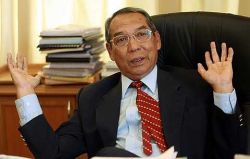http://harismibrahim.wordpress.com/2013/01/24/oh-no-you-dont-abdul-rashid/
We are here, not because we are law-breakers; we are here in our efforts to become law-makers – Emmeline Pankhurst
Oh, no, you don’t, Abdul Rashid
Posted on January 24, 2013
18


By Singa Terhormat
___________________
The Daily Express, an East Malaysian newspaper, in an article dated 23rd September, 2011, reported that Tan Sri Abdul Rashid Abdul Rahman,
 former
Election Commission (EC) Chairman (and before that its Secretary since
at least the early 1980s), denied the truth of a United States embassy
cable posted on WikiLeaks (which) revealed that he had admitted to
issuing more than 60,000 fake Malaysian identity cards in Sabah on
Umno’s instructions.
former
Election Commission (EC) Chairman (and before that its Secretary since
at least the early 1980s), denied the truth of a United States embassy
cable posted on WikiLeaks (which) revealed that he had admitted to
issuing more than 60,000 fake Malaysian identity cards in Sabah on
Umno’s instructions.This is how the Daily Express reports his reaction:
“That can’t be true. I had nothing to do at all with this and I was never involved in issuing Ics.”What the EC did was only to register citizens with ICs as voters,” he said, adding that IC matters were within the National Registration Department’s prerogative. The cable quoted former Malaysians for Free and Fair Elections (Mafrel) chief Malek Husin as claiming that Rashid had confessed this to him during a private meeting at the latter’s house on Oct 25, 2006. It also stated that Malek was said to have informed the US embassy officials that Rashid allegedly confirmed that this strategy was meant to wrest political control of Sabah which was held until 1994 by then opposition front Parti Bersatu Sabah (PBS).
During that decade, claimed the cable, Umno had granted citizenship and Malaysian identity cards to over 600,000 foreign migrant workers (predominantly Muslims from Indonesia and Mindanao in the Philippines) in Sabah, in exchange for their votes in state Assembly Elections.”
The Daily Express added:
“Rashid however recalled being informed by the opposition parties in Sabah about an allegation of registering foreigners as voters.
“They then asked me to check the ICs of these people, which I refused as this was not within our authority but NRD’s.”
The Harakah Daily of 23rd January, 2013 speaking of this same Abdul Rashid reports:
“ Rashid admitted that there were major issues with regards to the electoral roll, but said cases of foreigners being registered as voters should be blamed on the National Registration Department.
“EC has no powers to intervene in such cases. This mess… it is NRD’s,” he said, admitting that foreigners were issued with Malaysian identity cards and had signed up as voters in Sabah.”
So Abdul Rashid says he was never involved in issuing ICs as IC matters were within the National Registration Department’s prerogative.
Of course the National Registration Department is the one that issues ICs.
Any fool knows that. Any fool knows that it is not the EC that issues ICs.
Could there have been complicity between both bodies, the EC and the NRD, to carry out these unholy acts though?
Mohd Nasir Sugip, a former Sabah National Registration Department (NRD) officer, alleges so.
Abdul Rashid, you now admit that there were major issues in the electoral rolls but maintain that the blame lies with NRD and not you or the EC and so you did nothing about it.
Was that responsible of you, Abdul Rashid?
On an issue that affects the sovereignty of this nation and the democratic rights of its peoples you did nothing about it?
And you were the Secretary and later Chairman of the EC!
Did your job scope as such not require you to ensure the integrity of the electoral rolls?
Was it not a duty you owed to the nation and all its peoples?
As a Kelantanese, Abdul Rashid, you surely have come across and understand the meaning of “Kami tok se oren make gaji buto”. (We do not want those who take their salary without earning it.)
On reflection now, do you feel you fully earned yours?
And Abdul Rashid, what do you now have to say about the evidence given at the ongoing Royal Commission of Inquiry on this matter where it is reported that Mohd Nasir Sugip, a former Sabah National Registration Department (NRD) officer, is reported to have said that “the operation involved providing the immigrants with new identity card numbers based on the date of birth, photographs and names provided by the EC” and that “the names were changed, IC numbers were changed, date of birth was changed… and their pictures,” ?
Now Abdul Rashid, pray tell us what was the EC doing providing the NRD with dates of birth, photographs and names to the NRD, as alleged?
How did it fall within the scope of functions of the EC to provide such information, if that is true?
For what purpose, pray tell?
As reported, Mohd Nasir Sugip also claimed that “his department had once taken instructions from the state Election Commission (EC) to provide unqualified immigrants with identity card numbers so that they could vote in the election.”
Please enlighten us on all these matters, Abdul Rashid.
Do not patronize us by now saying that the “present electoral system must be reformed” and that you “propose that voters are re-registered the way population census is done” as reported by Harakah Daily.
Harakah Daily also reports that you said “by carrying out a completely new registration process, the suspicions and allegations over the reliability of the voters list could be put to rest once and for all.”
Eureka!
All problems solved?
No, Abdul Rashid, things do not work that way.
The matter will not disappear just by now undertaking a new electoral rolls exercise.
It is understandable that you may wish that the problem can be dealt with and discarded in that manner.
What wrongs have been committed can be overlooked and forgotten?
A great injustice appears to have been done to this nation and its peoples during the time you were EC Secretary and later Chairman and you have to take the responsibility to answer all those allegations, which if true, amounts to high treason.




